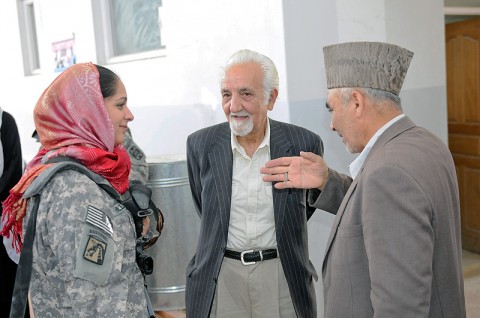Written by Spc. Michael Vanpool
101st Sustainment Brigade, 101st Airborne Division (AA) Public Affairs


Balkh Province, Afghanistan – Around a large conference table sits they sit, a mixture of suits, the National Dress of Afghanistan, and camouflage.
Afghan men and women traveled from the 66 villages of the Dehdadi district here to have a seat, and in turn a voice, at this table.
Once a month, leaders with the 530th Combat Sustainment Support Battalion, 101st Sustainment Brigade, conducts a shura with the local government and village elders of Dehdadi to discuss methods of improvement for the region.
Numerous local reconstruction projects started from these meetings. The battalion listens to the needs of the locals to start reconstruction through the Commander’s Emergency Response Program.

The theme of each meeting remains constant:;education, healthcare and water are emphasized for the 100,000 families here, and they discuss specific needs of the community. Out of the meetings, the battalion learned ways to help, including building wells and refurbishing schools, hospitals and mosques.
“The people of Dehdadi are very excited about the reconstruction, the hospital, the schools, the wells, by International Security Assistance Forces, and American forces,” said Wali Shah, the sub governor for the Dehdadi district.
Around the table, the village elders express the building and improvement of public areas for the hundreds of people they represent.
“The purpose of the CERP program is not to fund projects that are going to turn around and make individuals money,” Height said, “it’s more trying to help the community and serve as many people as possible.”
As men continue their talks, Height and other female Solders walk to another room and listen to the other half of the community. Though their numbers are smaller than the men next door, the Afghan women spoke with larger voice.
“Being from the western world when you think of Afghan women, you would think very docile, very meek, almost passive, but they were far from that today,” Height said.
“Once the men left the room, and the older gentleman translated, I could not understand the language in which they spoke, but the passion could transcend any language. It was universal.”
Their words echoed with the intensity of the thousands of women in Dehdadi. Their enthusiasm was powered by the hope of a better future for their children.
“They were passionate about the things that were important to them, such as computers, such as schools, such as health care,” Height said.
“It transcends nationality, race, language. It’s something women around the world are concerned about. The same things that matter to American women, to European women, to African women, it matters to them as well.”
While they discussed the significance of simple improvements, such as desks and school supplies for the 31,000 students in Dehdadi, the women also looked toward the future. They stressed the need for computers, common in American classrooms, to prepare their children and grandchildren for a better tomorrow .
As Height diligently took notes of the women’s concerns, a soldier next door wrote down the needs brought on around the table with the local men. When they leave the shura, the transcripts will lay the groundwork for future projects of the CERP team.
Soon, the soldiers and locals will meet again as the words from around a table evolve and become refurbished hospitals, schools and mosques. From the ground breaking to the ribbon cutting, the Soldiers of the CERP team will see the men, women and children that benefit from the renovations.
“To see the little children playing and giving a thumbs-up, they can’t speak the language, but they give a thumbs-up,” Height said. “A thumbs-up means, ‘Hey we really like this, we really want you to be a part of what’s going on here.’ It’s amazing, and even though we’re changing their lives, in some way indirectly, they’re changing ours too.”


